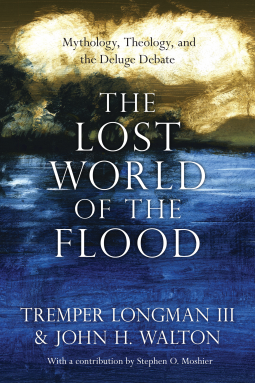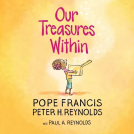
The Lost World of the Flood
Mythology, Theology, and the Deluge Debate
by Tremper Longman, III; John H. Walton; Tremper Longman III
This title was previously available on NetGalley and is now archived.
Send NetGalley books directly to your Kindle or Kindle app
1
To read on a Kindle or Kindle app, please add kindle@netgalley.com as an approved email address to receive files in your Amazon account. Click here for step-by-step instructions.
2
Also find your Kindle email address within your Amazon account, and enter it here.
Pub Date Apr 03 2018 | Archive Date Apr 03 2018
InterVarsity Press | IVP Academic
Talking about this book? Use #TheLostWorldOfTheFlood #NetGalley. More hashtag tips!
Description
"The flood continued forty days on the earth; and the waters increased, and bore up the ark, and it rose high above the earth . . . and the ark floated on the face of the waters" (Gen 6:17-18 NRSV).
In modern times the Genesis flood account has been probed and analyzed for answers to scientific, apologetic, and historical questions. It is a text that has called forth "flood geology," fueled searches for remnants of the ark on Mount Ararat, and inspired a full-size replica of Noah's ark in a theme park. Some claim that the very veracity of Scripture hinges on a particular reading of the flood narrative. But do we understand what we are reading?
Longman and Walton urge us to ask what the biblical author might have been saying to his ancient audience. Our quest to rediscover the biblical flood requires that we set aside our own cultural and interpretive assumptions and visit the distant world of the ancient Near East. Responsible interpretation calls for the patient examination of the text within its ancient context of language, literature, and thought. And as we return from that lost world to our own, we will need to ask whether geological science supports the notion of flood geology.
To read Longman and Walton is to put our feet on firmer interpretive ground. Without attempting to answer all of our questions, they lift the fog of modernity and allow the sunlight to reveal the true contours of the text. As with other books in the Lost World series, The Lost World of the Flood is an informative and enlightening journey toward a more responsible reading of a timeless biblical narrative.
The books in the Lost World Series follow the pattern set by Bible scholar John H. Walton, bringing a fresh, close reading of the Hebrew text and knowledge of ancient Near Eastern literature to an accessible discussion of the biblical topic at hand using a series of logic-based propositions.
Advance Praise
"The Lost World of the Flood lays before serious Bible readers a consistent examination of the text itself, an honesty about hyperbole in the flood narrative, a splendid locating and explaining of the flood story in the context of the ancient Near East, a profound grasp of the theological value of the text, and a noble example of how to read the Bible as the Word of God. A brave and sound accomplishment."
-Scot McKnight, Julius R. Mantey Professor, Northern Seminary
"A 'plain sense' reading of the biblical flood account has been under siege since the inception of 'flood geology' nearly a century ago. In an effort to uphold the truth of Scripture, many well-intentioned Christians have instead ravaged both the biblical text and the field of geology. In The Lost World of the Flood, Longman and Walton make great strides in retrieving biblical authority from interpretations of Genesis 6 through 9 founded upon poor exegesis and equally poor science. With a firm but gentle hand the authors lead their readers into the world of ancient Israel, offering an interpretation of the biblical flood narrative that honors the authority of Scripture and respects the scientific consensus on geological matters."
-Kyle Greenwood, associate professor of Old Testament and Hebrew, Colorado Christian University
"Two scholars of the ancient Near East and the Bible join a geologist to address a vexing question from Genesis: what was the nature and extent of the biblical flood? With clarity and logic, they present a position counter to traditional evangelical 'orthodoxy' but which, if seeking to be rebutted, will need to be addressed with equal clarity and logic."
-David W. Baker, professor of Old Testament and Semitic languages, Ashland Theological Seminary
"The authors have provided yet another excellent Lost World volume for readers who seek a deep-dive into this controversial topic in order to strengthen their faith. This volume will be a great help to all who exemplify faith seeking understanding."
-Bill T. Arnold, Paul S. Amos Professor of Old Testament Interpretation, Asbury Theological Seminary
"John Walton, the Indiana Jones of biblical Lost Worlds, has done it again! After maneuvering through the thickets and surveying the topography of the Ancient Near Eastern cultural landscape of the Lost Worlds of Genesis 1, Scripture, and Adam and Eve, Walton maps the terrain of the Lost World of the flood. On this journey Walton is accompanied by Old Testament scholar Tremper Longman and geologist Steve Moshier. As in earlier ventures into Lost Worlds, Walton and Longman, bolstered by an evangelical high view of Scripture, set forth their findings in a series of propositions. In their interpretations of the Genesis flood narrative as well as the narratives of the sons of God and the tower of Babel, they apply insights from the Ancient Near Eastern cultural context, which, they maintain, was common to both Israel and its neighbors. They conclude that the overarching theme of non-order, order, and disorder in relation to the divine presence is at the heart of the narratives. In essence, these familiar stories were rooted in actual, historical events, such as a significant local flood, but described in figurative language entailing hyperbole to make significant theological points about God's presence. The authors insist that the narratives were not intended to provide information with which to reconstruct the historical events themselves. In support of that contention, Moshier provides a geological critique of flood geology, the view that Genesis teaches a yearlong, worldwide flood that deposited most of Earth's fossiliferous strata. The Lost World of the Flood is a must-read for all fans of the Lost World books, especially those who are trying to understand Genesis 1–11 in the context of modern science. This book is a treasury of creative, thought-provoking proposals and insights, and is a pleasure to read."
-Davis A. Young, emeritus professor of geology, Calvin College
"In The Lost World of the Flood, John Walton and Tremper Longman III continue Walton's earlier work in his Lost World series, in this case connecting the flood and Babel narratives of Genesis chapters 6–11 to the earlier chapters, Abraham, and even events and sermons recorded in the New Testament. Walton and Longman examine the Mesopotamian geographic and cultural context for the pre-Abrahamic Genesis narrative. They demonstrate that the deliberate employment of selected historical vignettes in the early chapters of Genesis is rhetorically shaped. Significantly, Walton and Longman establish the role that hyperbolic language plays in the Genesis appropriation of its cultural backdrop. By so doing, they explain why the flood of Noah must refer to a significant regional event, not a planetary-scale cataclysm. They press a strong claim that those who attempt to ignore the original revelatory clientele are arrogating authority to themselves. If they are correct, then many assertions by those proposing a global tsunami-like flood are overconfident at best and misleading at worst. Walton and Longman deserve a lot of praise for their insightful approach and therapeutic discussion of the Noah narrative."
-Ralph Stearley, geography and environmental studies, Calvin College
"Many readers of the Bible are perplexed about how to understand the seemingly legendary stories in Genesis 1–11. In continuity with Walton's previous Lost World books, Longman and Walton—both of whom have written commentaries on Genesis—provide astute guidance for reading the flood narrative as part of the larger story of Genesis 1–11 and in the context of other ancient Near Eastern literature. Attentive to contemporary questions of science and history that many readers bring to the text, they zero in on the sort of literature the flood story is, helping us to better understand its theological claims, which are meant to impact human life both in ancient times and today."
-J. Richard Middleton, professor of biblical worldview and exegesis, Northeastern Seminary at Roberts Wesleyan College
Available Editions
| EDITION | Other Format |
| ISBN | 9780830852000 |
| PRICE | $23.99 (USD) |
Links
Average rating from 7 members
Featured Reviews
 Reviewer 331858
Reviewer 331858
Walton's "Lost World" books are widely recognized for their approach to difficult biblical issues. In particular, Walton's "Lost World of Genesis 1" and "Lost World of Adam and Eve" map out Walton's theological approach where others are inclined to take a historical approach to the text. Add Tremper Longman III, another well-established and widely published Old Testament scholar, and you have a winning combination.
As the title implies, this book focuses on the flood narrative. Walton and Longman explore the historicity, but primarily focus on the theological implications of the story, as well as discovering what they refer to as the "cultural river;" the term they use to describe the similarities among ancient near-eastern societies.
The book is well-worth the read, and I highly recommend it.
The Lost World is a thorough and thoughtful consideration of the Genesis flood account and the surrounding passages. Longman and Walton write in a logical and honest way, shedding light on the context of the story, the “cultural river” of the ANE and how the original writer may have intended the story to be heard. While holding firmly to the Bible being the inspired Word of God, the authors carefully disarm some more shallow and naïve interpretations of the flood story. Using a series of clear propositions, this book is written in a way that provides tools for not only interpreting the flood story, but for approaching other historical passages in the Bible. The book doesn’t claim to have all the answers, but certainly provides a well-rounded understanding of the story of the Genesis flood.
Readers who liked this book also liked:
Peter H. Reynolds with Paul A. Reynolds
Children's Nonfiction, Religion & Spirituality






